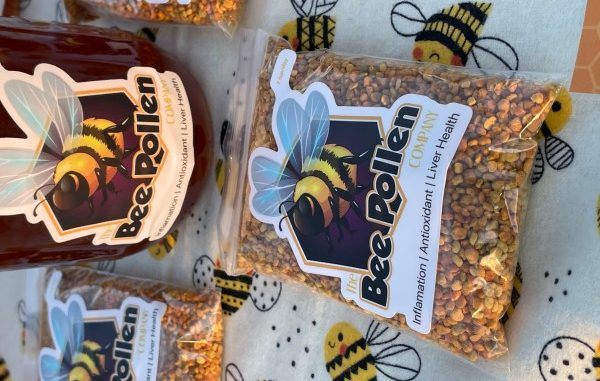
Top bee pollen for weight loss benefits? Did you know that you can treat asthma using bee pollen? That’s right. By adding it to your diet, you add antioxidants to your body. They have an especially beneficial effect on the lungs. The antioxidants fight any potential or existing inflammation. Better breathing is only one benefit. When you breathe better, you give your body more oxygen. This notion means every process in the body speeds up, helping everything from weight loss to fighting diseases.
Bee pollen boasts an impressive nutritional profile. It contains over 250 biologically active substances, including proteins, carbs, lipids, fatty acids, vitamins, minerals, enzymes and antioxidants. The latter category includes vitamins, minerals, antibiotics and antioxidants. However, the pollen’s nutritional content depends on the plant source and season collected. For instance, studies have shown that bee pollen collected from pine plants has approximately 7% protein, while pollen collected from date palm packs closer to 35% protein. In addition, bee pollen harvested during springtime has a significantly different amino acid composition than pollen collected during the summer. Summary Bee pollen contains over 250 biological substances, including protein, carbs, fats, vitamins, minerals, enzymes and antioxidants. The exact nutrient composition depends on the plant source and season collected. Read even more information on bee pollen.
It is also used for weight loss, bleeding problems including coughing or vomiting blood, bloody diarrhea, nosebleed, brain hemorrhage, and menstrual problems. Bee pollen is also used for gastrointestinal (GI) problems including constipation, diarrhea, enteritis, and colitis. Some people use bee pollen as a general tonic, to increase urine flow, and for alcohol intoxication. Bee pollen is used topically for skin care in skin softening products, and for treating eczema, pimples, and diaper rash. You may hear claims that bee pollen enzymes (chemical compounds that assist in chemical reactions) provide a variety of treatment benefits. However, any enzymes in bee pollen are likely to be digested in the gastrointestinal (GI) tract. There is no reliable evidence indicating that bee pollen enzymes or other ingredients in bee pollen are effective as treatment.
By adding bee pollen to your diet, you give your body the unique chance to have an efficient digestive tract. How do you do that? It’s simple; bee pollen contains lots of valuable enzymes that work wonders. Bee pollen helps your intestines and the rest of your body get all the necessary nutrients from food. Add that to the existing protein, vitamins, and minerals, and you’ll get a formidable combo. This addition will significantly improve your body. You’ll be thankful later.
Bee pollen contains vitamins, minerals, carbohydrates, lipids, and protein. It comes from the pollen that collects on the bodies of bees. Bee pollen may also include bee saliva. It’s important to avoid confusing bee pollen with natural honey, honeycomb, bee venom, or royal jelly. These products do not contain bee pollen although there are combination products that contain one or more of these substances. You may find bee pollen in other natural dietary supplements, as well as in skin softening products used for baby’s diaper rash or eczema. You may also hear recommendations for using bee pollen for alcoholism, asthma, allergies, health maintenance, or stomach problems, but there is no proof that it helps with these conditions. Before you take any natural product for a health condition, check with your doctor. Bee pollen is also recommended by some herbalists to enhance athletic performance, reduce side effects of chemotherapy, and improve allergies and asthma. Discover extra information at thebeepollen.com.
